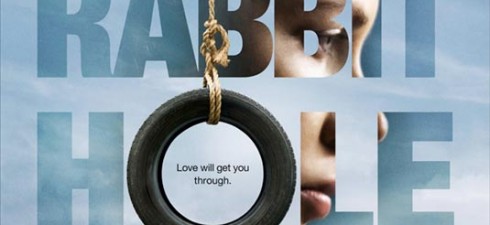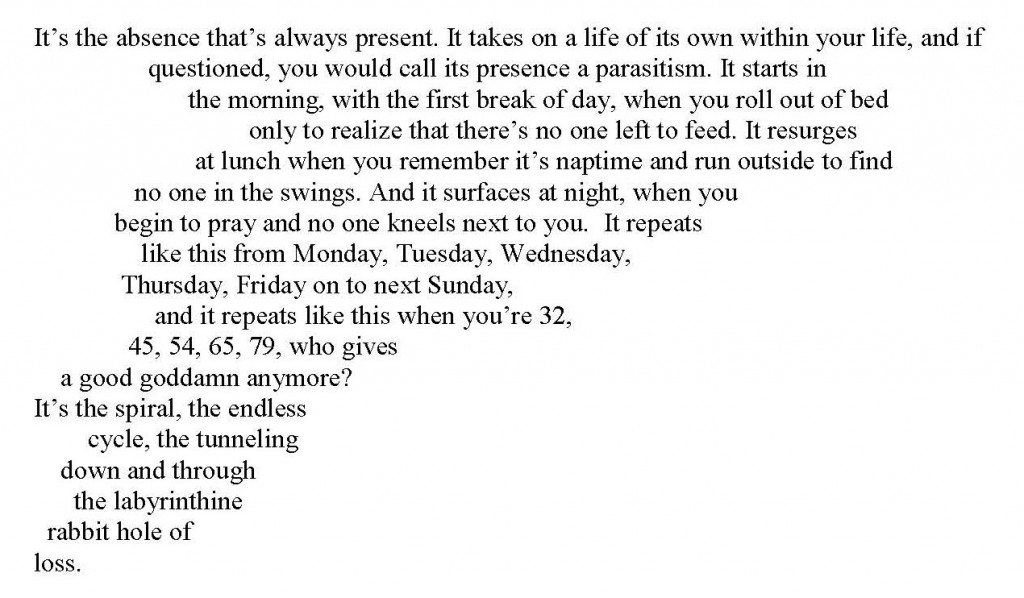Today’s guest post was written by Amanda Mixon, a graduate student of English at Texas State University in San Marcos, Texas.
This is where John Cameron Mitchell’s (director) Rabbit Hole takes us: the mourning process; in media res. An adaptation of David Lindsay-Abaire’s play of the same name, Rabbit Hole, at its core, seeks to capture the essence, the contagion of loss-how it spreads, lingers, and generates varying symptoms in each individual. And, naturally, each individual attempts to self-medicate and grieve in her or his own way, which further complicates the familial unit’s drive to create a collective mourning process or common ground upon which to support one another. We see the mother, father, grandmother, and aunt of a deceased toddler burrowing their own respective tunnels in disparate directions that never connect nor converge; rather, the insistent divergence engenders tension, guilt, anger, jealousy, and repression. The loss haunts and permeates the daily existence of the family, rupturing moments of joy, such as the aunt’s conception of a child, and moments of sisterly duty, such as the passing along of hand-me-downs, with confrontations spurred by the child’s absence. Everything seems to revolve around that loss-which is why Rabbit Hole demands viewing. It poignantly depicts not only the paternal dynamics of losing a child, but how a single loss can shatter a family, can render it inoperable, mute, and unable to cope with its psychical wounds.
The film succeeds through the technique of in media res and strong acting performances all the way around. Unlike, for instance, In the Bedroom, in which the death of a son evolves for us onscreen before his parents’ subsequent portrayal of loss, Rabbit Hole invites us into the lives of Becca (Nicole Kidman) and Howie (Aaron Eckhart) eight months after the death of their son, Danny. Initially, the story offers no facts concerning the nature of Danny’s death. Instead, through viewing the various mourning processes of Becca’s family, we slowly become privy to the details of his passing. By presenting information this way, Lindsay-Abaire, who also wrote the screenplay, shifts the primary focus of the story from the actual death itself, to the narrative of loss. Lindsay-Abaire simultaneously bars the opportunity for a melodramatic portrayal of death and opens a venue for authentic discourses of loss.
As mother (the psychoanalytic paradigm of loss), Becca becomes the locus of the mourning process, with her story taking precedence over those of her family-even Howie’s. She functions as the center of the plot, upon which the other characters, or satellites, revolve. Considering Kidman’s past successful depictions of mourning, and I’m thinking here especially of her performance as Virginia Woolf in The Hours, it’s not surprising that she delivers a classic and convincing performance in Rabbit Hole. Likewise, Eckhart, the grieving father that endures the constant opposition of his wife while facing temptation, and Tammy Blanchard, Becca’s immature, younger sister, also contribute solid performances. However, perhaps Becca’s two most interesting relationships involve Jason (Miles Teller), the teenager that accidentally kills her son, and her mother (Dianne Wiest), who has also lost a son. Performing a rather abject oscillation between Jason and her mother, Becca welcomes and actively seeks out Jason’s company, while often displaying outright hostility towards and rejection of her mother’s guidance. Yet, it is in and through Becca’s conversations with Jason and her mother that the film offers hope, for we witness her working through the grieving process, attempting to make it manageable. We, those who have experienced traumatic loss, learn with her what we’ve always known: There’s no such thing as escaping or forgetting. There’s only maintaining.
Becca: Does it ever go away?
Mother: No. I don’t think does. Not for me it hasn’t. It’s going on eleven years. It changes, though.
Becca: How?
Mother: The weight of it I guess. At some point it becomes bearable. It turns into something that you can crawl out from under, and you know, carry around like a brick in your pocket. And you, you even forget it for a while, but then you reach in for whatever reason and there it is. Oh. Right. That. Which can be awful, but not all the time. It’s kind of not that you like it exactly, but it’s what you’ve got instead of your son, and so, you carry it around. And, uh, it doesn’t go away, which is . . .
Becca: Which is what?
Mother: Fine, actually.



Gah. I guess I will have to see this. I usually don’t love movies that deal with kids who have died (for obvious reasons) . . .
Amanda, great review.
This bit of dialogue really struck me. I think it is not so much the weight that becomes bearable, but that we become used to carrying it, strong enough for the burden.
I confess I haven’t seen the film – but I will get hold of a copy thanks to your review!
To say a few things anyway about your piece, I’m interested in what you said about joining the life stories ‘in media res’… It seems fitting, because loss usually catches people in this way, I think – we don’t see it in terms of the arc of a relationship: the gaining, and then the inevitable goodbye. We will always feel the hardness of loss, because our memories are short. The movie is the perfect form, then, I think (alongside, perhaps, the short story), as its span pretty much requires we join ‘in media res’, and see an episode from life.
Speaking of Nicole Kidman, I wonder how you’d read ‘Eyes Wide Shut’ against ‘The Rabbit Hole’? It’s another case of loss – the loss of illusion and innocence… but I think the solution is somewhat different (summarised in the films final words, which I won’t quote, but if you’ve seen it…).
Great review. I really loved this film. Quiet, painful, but beautiful nonetheless. It fulfills what Tarkovsky once said: “The aim of art is to prepare a person for death, to plough and harrow his soul, rendering it capable of turning to good.”
Weird, I have this film at home right now. We were going to watch it last Sunday night, but watched “All Good Things” instead. Wish we had watched Rabbit Hole. This weekend.
I avoided watching this until last night–I usually choose not to watch movies about kids who die.
This is well worth watching.